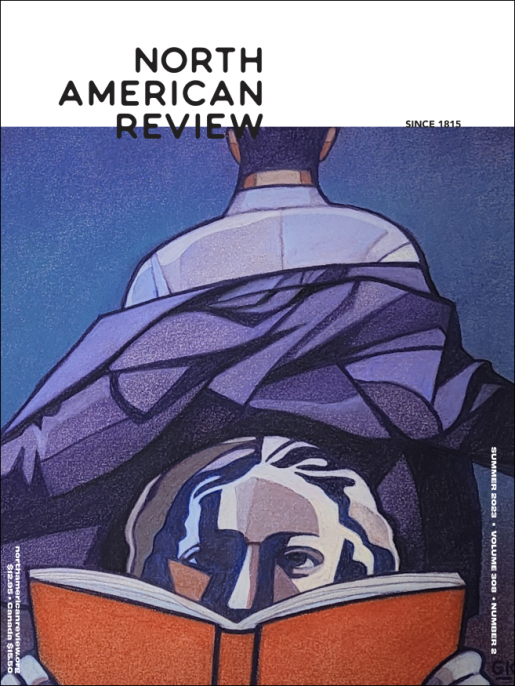
Buy this Issue
Never miss
a thing.
Subscribe
today.
We publish all
forms of creativity.
We like stories that start quickly
and have a strong narrative.
We appreciate when an essay
moves beyond the personal to
tell us something new about
the world.
Subscribe
FROM THE EDITORS
In Spring 1971, Robert Wachel speculated in the North American Review on the future of “Humanities and Computers,” narrating the humorous (hypothetical) process of a humanities scholar using an early computer, laboriously feeding keypunched IBM cards into the machine. He touted the groundbreaking development of the Administrative Terminal System (ATS), which allowed users to store a piece of writing on a computer to work on later. If that weren’t magical enough, in addition to “printing out as many copies as desired,” ATS offered “such additional features as automatic page numbering and headings, automatic centering of lines, and even justification of the right margin if so desired … . Because a regular typewriter keyboard is used, both upper and lower case are available for input as well as output.” In other words, ATS was a rudimentary word-processing program.
Seventy years earlier, the NAR published the first of six installments of Anticipations: An Experiment in Prophecy by H. G. Wells, who mentioned nothing of the paradigm-shifting word-processing revolution to come, but did articulate “certain speculations about the trend of present forces, speculations which, taken all together, will build up an imperfect and very hypothetical but sincerely intended forecast of the way things will probably go in this new century.” Anticipations was a hit on both sides of the pond, focusing on the effect of new mechanical technologies on transportation, urban design, warfare, and therefore democracy, public policy, social relations, and linguistic evolution. He believed there were two basic intellectual dispositions: one looking to the past, which is passive and weak, and one looking to the future, which is creative and active. Guess which one Wells was endowed with?
Like many a futurologist since, he was right about some things (in vague, hand-wavy ways) and wrong about others (in sometimes charming, sometimes alarming ways). He would later be crowned “world literature’s Great Extrapolator,” but he can hardly be expected to have prophesied in 1901 the invention of the television, lasers, the atomic bomb, personal computers, or the life-changing wonders of the electric toaster. As is true of all predictions, his tell us as much about his own time as they do about the actual future. Anticipations can only truly reveal the cultural preoccupations and anxieties of 1901, not the details of 1971, much less the reality of 2023.
Lest the NAR be judged by posterity as lacking in prophetic powers, we will only predict what we are 100% certain will be proven correct. We hereby predict, boldly and accurately: more predictions. This spring Thomas Friedman predicted that today would be “Our Promethean Moment.” Instead of fire, what has been stolen from Zeus is artificial intelligence, forever altering civilization, just as the scientific, agricultural, and industrial revolutions of the past did. Lots of smart people remain wary of the rapid advancement of AI and machine learning. Large language models like ChatGPT, Google Bard, and Microsoft Bing Chat; AI text-to-image generators like DALL-E and Midjourney; not to mention applications for cloning human voices and manipulating video—these powerful tools promise scientific advancement, medical breakthroughs, and efficiency in the workplace, but they also portend the loss of jobs, if not the loss of our souls. Thousands of tech leaders recently signed a public letter urging a pause on further AI research, worried about the “profound risks to society,” including the existential risk associated with geopolitical turmoil caused by disinformation and deepfakes, or in the words of Theodor H. Nelson “cybercrud.”
In our purview of the literary arts, predictive AI still approaches its tasks like beginning writing students, apt to beg their teachers, “What do you want from me?” The only possible answer to this question can be “I don’t know.” Honest writing teachers don’t want merely competent writing. They want their students to become daring, independent, and original thinkers, who write because they have something to say, or to ask, or because, quite simply, they want to create something strange and beautiful, new and astonishing. AI is trained on a vast corpus of information, more words than any one of us could read in our lifetimes. Its assumptions are based on what we already know, words that have already been written. It can remix and recombine, but it cannot actually create something new that we would recognize as art. Ironically, then, our Promethean moment of the future is forever stuck in the past.
Alan Turing’s famous test posited that a machine convincing a human that it was another human would have achieved intelligence. Machines have already reached this benchmark, but they are far from reaching the general intelligence humans possess. As Abeba Birhane points out in “The Impossibility of Automating Ambiguity,” humans are “ambiguous, indeterminable, and inherently unpredictable.” A computer may sound human, but that’s only a performance. It cannot contain the “active, fluid, messy, and unpredictable nature of human behaviour and the social world at large” any more than it can give you a kiss—and mean it.
We’re pleased to share many works of art in this issue that a machine could never have produced, including the winner of this year’s Kurt Vonnegut Speculative Fiction Prize. Dashka Slater’s “The Jeanines of Summer” tells the story of a couple falling in love with their housekeeper Jeanine, who happens to be —that’s right—a machine. You’ll find other pieces of fiction, nonfiction, poetry, and visual art in these pages that are rendered with nuance, deep sympathy, and sensitivity to our inevitable frailty and longing, all of them contending precisely with the lovely messiness of human ambiguity. ⬤

